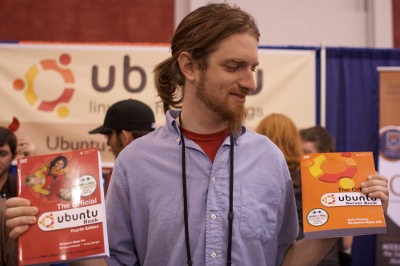I roll my eyes a little when I think that Unhappy Birthday is the document I have written that has been read by the most people. The page — basically a website encouraging people to rat on their friends for copyright violation for singing Happy Birthday in public — has received millions of page views and has generated tons of its own media (including a rather memorable interview of CBC’s WireTap). At the bottom of the page I am listed, by name and email, as the “copyrighteous spokesman” for the initiative.
And since the page has been online, I have received hate mail about it. Constantly.
Since the email only goes to me, I thought it might be fun to share some of these publicly. All these messages are quoted verbatim but I have not included the senders’ names. Be warned: the language is often salty.
This email is years old now but it is probably still my favorite:
Atrocity and strife run rampant in this world.
Babies are abandoned in dumpsters. Teachers molest students. Impoverished Indonesians make sneakers for pennies while the spoiled jackhole in the 30-second commercial makes millions for sinking a three-pointer and smirking at the camera. Forms of religion are interpreted as to compel people to strap explosives to their chest and board buses full of innocents. Boss Tweeds embezzle and get severance pay while John Q. Workingman gets put out on the street when the corporation goes belly up.
Out of all these indignities and countless others I haven’t the time to mention, why do you make it your personal crusade to assist in the flagrant persecution of family restaurants for partaking in the time-honored tradition of singing “Happy Birthday”? God forbid these foul brigands bend copyright law in order to bring a smile to somebody’s face.
Food for thought…without the accompanying song.
Many others strike a defiant, if less poetic, tone:
Good luck! There are millions of us who refuse to accept the ridiculous “copyright” on Happy Birthday. If Time Warner were an ethical company rather than a greedy megacorp they would do something truly special and release it into the public domain.
There are some things in this world more important than money.
Quite a few people notice that my last name is Hill and suspect that I must be related to the Hill sisters who originally penned the song. I’m not, to my knowledge, although since Time Warner bought the rights, it’s not clear it would matter:
I am writing to just let you know how disappointed I am that a large corporation and others (like the HILL family) are making $2 million plus for a song that was created over 100 years ago with noone knowing who created the lyrics! None of us at our place of employment could believe this and we certainly won’t encourage people to send money to ASCAP. It is a shame that ASCAP license fees aren’t used to pay more to up-and-coming artists who I’m sure need this money alot more than Time Warner.
We all plan to sing Happy Birthday MORE now in public places and if anyone asks if it is copyrighted we will say “of course not”. Maybe this way the song will not die out completely as more and more other “birthday” songs are being sung. It would also be nice if your website cited whose opinion is writing the piece and your obvious conflict of interest.
Or another:
Is it a coincidence that your last name is the same as the last name of the authors of the song “Happy Birthday?” You seem to have a personal monetary motive for your work with the “grassroots project” you call Unhappy Birthday, and if you do not, your concern is misplaced all the same. Whom do you imagine your campaign serves? And do you realize whom it harms?
I do not question the illegality of performing the copyrighted song publicly. And you are correct that most of the public is not even aware that the song is under copyright. I think the harm done to Time Warner and its associates by such public performances is far outweighed by the joy created when the much-loved happy tune is shared.
I urge you to ask yourself why you think the immortal Hill sisters wrote the song in the first place. It was not to put more money Time Warner’s pocket. It was, I would argue, for the sake of the song itself and the happiness it brings when performed (publicly or otherwise). Please consider siding with the children and the artists; let the lawsuits alone.
Some people suspect the site may be satire, but include insults and and attacks just in case it isn’t:
I’m trying to figure out if your Unhappy Birthday site is meant to be in jest. If so Rofl, and congrats on a hilarious site. If you’re actually serious, then fuck you Nazi cunts and your corporate butt buddies. Thank you for your time.
Or these two alternatives (each were separate emails):
If this is a joke then it’s rather funny. However if this website is serious then you’re a fucking idiot. Get a life!!!!
if it is a form of protest, then THANK YOU! if it is not, then screw you all!
One memorable piece of mail was from someone who knew of me from my activities in the free software and free culture communities and had a hard time reconciling my work there with the high protectionist website:
I was quiet surprised to see your name and email address at the bottom of the home page of the site Unhappy Birthday. The site claims that you are their spokesman.
Is this correct? I do not understand… You have all this Open Source/ Free Software background and then this site that defends one of the most controversial copyright issues???
Do you really mean this? Do you want to help Time Warner?
I’ve also received probably half a dozen mails that offer some sort of support! For example, this person liked the website — and even wanted to buy one of our t-shirts — but objected to our logo:
I was going to buy one of your products from your Unhappy Birthday Shop at CafePress but there’s a problem.
I hate emblems that uses human skulls in them.
Being a member of ASCAP I really do support your cause but I can’t buy a product that I would never wear.
And many people are simply confused asking something like this one:
So I saw the unhappy birthday site and I’m just a little confused. Is this a joke or a serious thing?
I usually reply and explain that I have tried to ensure that the site describes the legal situation around Happy Birthday honestly and correctly.
That said, the vast majority of messages I receive are unequivocal. Like this email that I received last week addressed to “you anti-free speech fascists”:
__
/ \
| |
| |
| |
__ __ | | __
/ \/ \| |/ \
| \
| |
| /
| \
| /
\ /
| |
| |
Half an hour later, the author followed up with a English version of the same message, set to the tune of happy birthday.
You might think that getting insulted and flipped off by confused people on the Internet might
get me down. It doesn’t! I made Unhappy Birthday because I thought that the fact that something as important to our culture as Happy Birthday could be owned was outrageous. Every piece of hate mail means that somebody else — almost always somebody who isn’t a “copyfighter” or a free culture geek — is now upset about the current state of copyright too.
Sure, Unhappy Birthday makes me a tiny bit sad about people’s ability to recognize satire. But it makes me really happy about people’s ability to get very annoyed at what they think is the outrageous control of our culture through copyright. When more people are as mad as the the people I’ve quoted above, we will be able to change copyright into something less outrageous to all of us.

